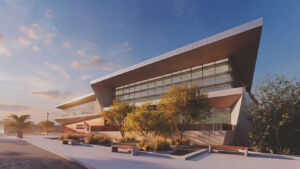The Greater Phoenix retail market finished the second quarter with positive net absorption, despite the impact of pandemic business interruptions, according to a report from Colliers International. Vacancy remained healthy, but experts look towards the second half of the year to determine the long-term effects of COVID-19.
The retail sector posted positive net absorption of 14,134 during the second quarter. West Valley with 88,540 square feet, North Phoenix with 76,551 square feet and South Mountain with 56,928 square feet, were the leading submarket clusters. Scottsdale experienced the largest negative net absorption, primarily because of national brand gyms and home décor store closures.
Retail vacancy remained low at 7.3 percent, matching the vacancy rate of the first quarter of 2020 and the second quarter of 2019. The Airport Area maintained the lowest vacancy at 3.7 percent. The largest decrease in vacancy year-over-year took place in the South Mountain submarket, which now has 6.7 percent vacancy. Four new retail centers were completed during the second quarter and two of these are fully leased. Laveen Park Place at 59th Avenue and Baseline Road is fully leased by Sprouts, TJMaxx and Michaels. The 35,399-square-foot new property at 1727 W. Ranch Rd. in Tempe has been fully leased by EOS Fitness. Punch Bowl Social, which was expected to take occupancy in Downtown Phoenix, lost its funding from Cracker Barrel Old Fashion and never had a chance to open its doors.
Construction activity in the retail sector remained fairly steady. Building was disrupted on two projects due to supply chain issues. But projects currently underway are approximately 90.3 percent leased.
Rental rates for retail space have risen 2.0 percent year-over-year but declined 1.6 percent during the second quarter. Average asking rental rates are now $14.82 per square foot. Northwest Phoenix, South Mountain and East Valley submarkets experienced the largest year-over-year asking rate increases. Scottsdale and North Scottsdale suffered the largest decrease in rental rates year-over-year. Discounts on rental rates are starting to become visible and the second wave of closures for gyms, bars and movie theaters is creating additional financial disruption.
Investment sales volume (Over 10,000 SF and over $1 millon) decreased 67 percent during the second quarter. Approximately $73 million of sales were completed during April through June, compared to $223 million in transactions during the first quarter of 2020. The median price per square foot declined 7.2 percent over-the-quarter and 3.3 percent over-the-year. Investment sales during the second quarter were led by three Walgreens transactions in Tempe, Chandler and Buckeye.
Transactions during the past three months included some noteworthy small properties that traded at high prices. Three properties averaging 804 square feet in size commanded an average price of $2,782 per square foot. These include the Dutch Bros. at 1005 S. Watson Rd., Salad and Go at 3095 E. Queen Creek Rd., and Salad and Go at 9875 W. Lower Buckeye Rd. These drive-thru focused retail stores were not adversely impacted by the coronavirus shutdown.
Despite daily negative headlines, retailers are creatively exploring new business solutions that enable them to stay successful while adhering to pandemic restrictions. As witnessed during the reopening in May, there is pent up consumer demand to socialize and re-connect with pre-COVID lifestyle elements. One of the casualties of the pandemic will be obsolete malls and vacant large big-box spaces. These properties are prime for entrepreneurial redevelopment after the crisis passes.



